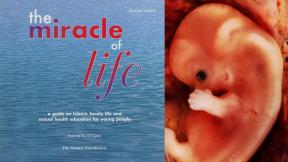
Islamic schools and sex education may seem like a contradiction for some. After all, don't parents send their kids to these schools to protect them from sex?
Not so for Dalya Aglan. The 16-year-old, in the course of a biology class, was given the low down by her biology teacher on pregnancy, menstruation, and sexual maturation amongst adolescents at her Muslim school in Montreal, Canada.
“She talked about it Islamically,” says Aglan about the approach her Muslim teacher used. “She talked about what was Halal, Haram and Sunnah. It's not like she was doing anything wrong. She was teaching us something we need to know.”
The class was mixed (boys and girls) but the question and and answer session was separate. Students were asked if they were uncomfortable. They all said no. The teacher also got the students' parents to sign permission slips for this.
“There was so much stuff we didn't know we could do like you can't have sex while the woman has her period, none of us knew that,” says Aglan matter-of-factly.
Such candor, though, is not something expressed in most Islamic schools in North America.
“In most of the Islamic schools, they avoid to deal with these issues,” says Abdalla Idris Ali, a member of the Islamic Society of North America's Majlis Shura. He is also the former principal of an Islamic school in Mississauga, Ontario in Canada.
Why sex is taboo in Islamic schools
Apart from the general embarrassment towards openly discussing sexual matters in most Muslim cultures, part of the reason also, it seems, is because parents assume Islamic schools are an environment where their kids don't have to talk about this issue. This is not the case.
“We think if we've brought them into the Islamic school atmosphere that we will somehow protecting them and isolating them from mainstream society, and that is not the case,” notes Winnipeg, Canada-based social worker Shahina Siddiqui. She points to television, magazines, billboards, and even Muslim friends with lower standards of morality who can still influence kids even if they attend an Islamic school.
“This society is immersed in sexuality,” she says, and adds that children still learn and absorb information outside of school.
In this scenario, “I would rather that we teach our children [sex education] with Islamic values,” she tells Sound Vision.
Lack of proper curriculum
While public schools across the United States, for example, have an established curriculum for sex education, in the context of a Family Life Education program, there is nothing similar for Muslim schools.
”Right now we don't have a curriculum for that and we should have an Islamic perspective,” says Siddiqui. “It can take any form, from starting with Tahara all the way to upper grades, but it should be customized and standardized for Muslims just to maintain the Adab (etiquette), to make sure what is being taught is appropriate, to maintain quality of education.”
But Idris Ali disagrees with making sex education a topic or a course in itself. He says it should come in “what we call a normal progression.” In other words, it should come in the context of things like for example, explaining Ghusl and mentioning when it is necessary (for instance, after sexual intercourse, and after menstruation).
“There is a wider context where these things will come, so they don't come by themselves,” he says.
Make it age-appropriate
“The biggest fear we have is that our children will be exposed to these things before they are ready,” says Siddiqui.
Idris Ali suggests the topic in Islamic schools be introduced starting grade four in the context of hygiene. These classes should be separate for boys and girls if the classes are generally mixed.
“I don't think a single Muslim parent would have a problem with introducing Tahara (personal hygiene),” says Siddiqui. During this discussion, menstruation for girls can be discussed and the appropriate method of cleaning, in this case Ghusl, when a period is over.
She recommends the following age-topic breakdown:
1. starting discussions on Tahara in Islamic schools in grade six or seven.
For girls, at the age of 13, talk about personal hygiene and menstruation.
2. At 15, talk about the marriage relationship and the opposite sex. Here a discussion of the status of women in Islam and gender roles should be discussed in the course of sex education classes or discussion amongst both boys and girls.
3. After this, discuss pregnancy and birth control.
Siddiqui points out that children who attend Islamic schools tend to know less about sex than their public school counterparts, which is why the topics discussed at the ages she has suggested may seem behind what kids in public schools already know.
Pick the right teachers
Both Idris Ali and Siddiqui advise having a teacher of the same sex, and Siddiqui adds preferably someone who is married.
Idris Ali says in the Islamic school in Mississauga, a Muslim sister who is a doctor would come in to speak to the girls.
Siddiqui also advises having someone with a counseling background to speak to kids about the topic, since other, more serious issues may come up which a teacher with no such background may not be able to handle. For example, if a child who has been sexually molested confides in a Muslim teacher after a class or discussion on proper gender relations (i.e. no touching between the sexes, and even between the same sex), the teacher must know how to handle this.
Siddiqui says a specific position should be created for this job at Islamic schools.
Use the right Adab (Etiquette)
“When you are teaching morality, you have to teach the Adab yourself, so you will not be graphic, even within the same sex class group,” says Siddiqui.
As well, she says when discussing pregnancy and childbirth, books that are used should not contain photographs, for instance. Biology diagrams should be enough to teach about the human body.
Use a comparative approach
Idris Ali took the skeleton of the Family Studies course and adjusted it to the needs of Muslim children when he was in Mississauga.
This makes the approach to the topic not solely Western, or solely Islamic, but comparative.
This way, he says, the basic information is there, but the Islamic alternative is also presented. “This is the Quranic approach,” he says. “[The] Quran tells you all kinds of good things on one side and the bad on the other.”
If parents still object to sex education of any kind within an Islamic school context after these guidelines are followed, Siddiqui suggests giving it time and waiting a year or two.
But Aglan sees it differently
“The parents should be grateful because she's a Muslim teacher, she's giving it to us in an Islamic perspective so there's nothing to worry about.”








Comments
Teaching muslim kids about sex is so very important. Our kids go to school in different non-muslim countries, where they have to struggle to be a part of society. If they know whats right and whats wrong, and would know how to respect themselves and say "NO" wont it be wonderful. Rather, being a part of sin just to be a part of the world around. I do agree there is a certain age when they could be informed about it, probably at 15.Thank you!!
Location
I think this topic is very important and cannot be undermined, for Islam has taught us everything; thus one doesn't have to be embarassed from sex education. I have lived in Canada my whole life and been through the public school system in a state of ignorance because it was such a taboo topic. Consequently, I suffered not knowing how to perform Tahara properly. Thanks for bringing the topic out into the open.
Location
TO MAKE THE UNDERSTANDING CLEAR DISCUSS FURTHER AND COMPARE YOUR THOUGHT WITH THE OTHERS (NON MUSLUM)POINT OF VIEW.
Location
I don't think that sexual topics should be present at classes
Location
Pages
Add new comment